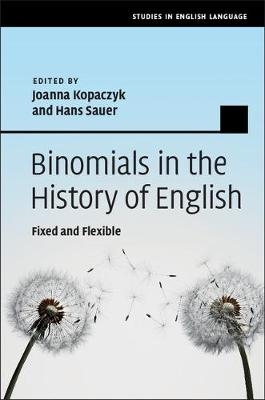
Binomials in the History of English
Cambridge University Press (Verlag)
978-1-107-11847-8 (ISBN)
Binomials, such as for and against, dead or alive, to have and to hold, can be broadly defined as two words belonging to the same grammatical category and linked by a semantic relationship. They are an important phraseological phenomenon present throughout the history of the English language. This volume offers a range of studies on binomials, their types and functions from Old English through to the present day. Searching for motivations and characteristic features of binomials in a particular genre or writer, the chapters engage with many linguistic levels of analysis, such as phonology or semantics, and explore the important role of translation. Drawing on philological and corpus-linguistic approaches, the authors employ qualitative and quantitative methods, setting the discussion firmly in the extra-linguistic context. Binomials and their extended forms - multinomials - emerge from these discussions as an important phraseological tool, with rich applications and complex motivations.
Joanna Kopaczyk is a researcher in Linguistics and English Language at the University of Edinburgh and an associate professor at Adam Mickiewicz University in Poznań, Poland. She is a historical linguist with an interest in corpus methods, formulaic language, the history of Scots and historical multilingualism. She has given talks at conferences in Europe, the USA and Australia, and taught on various aspects of the history of English and Scots at universities in Poland, Germany, Finland, and the UK. Hans Sauer is emeritus professor at Ludwig-Maximilians-Universität in München and currently also professor at Vistula University, Warsaw. He received a festschrift on his 65th birthday, and the commemorative medal of the faculty of arts at the Masarykova Univerzita v Brnĕ, Czech Republic. He was president of the International Society of Anglo-Saxonists (ISAS) in 2004–5, and a member of the advisory board of the Richard Rawlinson Center (RRC) at the Western Michigan University, Kalamazoo for twenty years.
1. Defining and exploring binomials Joanna Kopaczyk and Hans Sauer; Part I. Old English: 2. Pragmatic and stylistic functions of binomials in Old English R. D. Fulk; 3. Fixity and flexibility in Wulfstan's binomials Don Chapman; 4. Binomials, word pairs and variation as a feature of style in Old English poetry Michiko Ogura; 5. Binomials or not? Double glosses in Farman's gloss to the Rushworth Gospels Tadashi Kotake; 6. Lexical pairs and their function in the Eadwine Psalter manuscript Paulina Zagórska; Part II. Middle English: 7. Binomials in Middle English poetry: Havelok, Ywain and Gawain, The Canterbury Tales Ulrike Schenk; 8. Binomials in Caxton's Ovid (Book I) Elisabeth Kubaschewski; 9. Binomial glosses in translation: the case of the Wycliffite Bible Marcin Krygier; Part III. Early Modern English: 10. Binomials in several editions of the Kalender of Shepherdes, an Early Modern English almanac Hanna Rutkowska; 11. Binomials and multinomials in Sir Thomas Elyot's The Boke Named The Gouernour Melanie Sprau; 12. 'I do make and ordayne this my last wyll and testament in maner and forme Folowing': functions of binomials in Early Modern English Protestant wills Ulrich Bach; 13. 'Shee gave Selfe both Soule and body to the Devill': the use of binomials in the Salem witchcraft trials of 1692 Kathleen L. Doty and Mark Wicklund; 14. Binomials and multinomials in early modern English parliamentary acts Anu Lehto; Part IV. To the Present: 15. Developments in the frequency of English binomials, 1600–2000 Sandra Mollin; 16. Binomials in English novels of the late modern period: fixedness, formulaicity and style Jukka Tyrkkö; 17. On the linguistic and social development of a binomial: the example of to have and to hold Ursula Schaefer.
| Erscheinungsdatum | 23.06.2017 |
|---|---|
| Reihe/Serie | Studies in English Language |
| Zusatzinfo | 73 Tables, black and white; 2 Halftones, black and white; 30 Line drawings, black and white |
| Verlagsort | Cambridge |
| Sprache | englisch |
| Maße | 157 x 235 mm |
| Gewicht | 680 g |
| Themenwelt | Geisteswissenschaften ► Philosophie ► Sprachphilosophie |
| Geisteswissenschaften ► Sprach- / Literaturwissenschaft ► Sprachwissenschaft | |
| ISBN-10 | 1-107-11847-6 / 1107118476 |
| ISBN-13 | 978-1-107-11847-8 / 9781107118478 |
| Zustand | Neuware |
| Haben Sie eine Frage zum Produkt? |
aus dem Bereich


